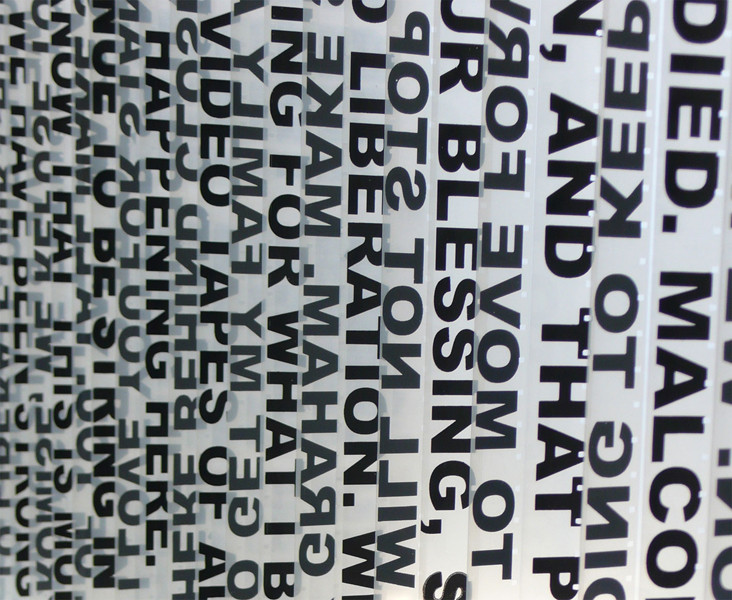Wolfgang Plöger
20 Sep - 26 Oct 2013
WOLFGANG PLÖGER
by any means necessary
20 September - 26 October 2013
Konrad Fischer Galerie Berlin is pleased to announce the opening of the second solo exhibition with Wolfgang Plöger (*1971) on September 20, 6pm - 9pm. The exhibit will highlight new works by the artist.
For several years Wolfgang Plöger has been interested in the recent discourse concerning verity and in questions raised by the investigations of Michel Foucault who analyzed the disintegration of the subject and simultaneous changes in the organization and structure of power. Plöger links his interest in these philosophical questions to the theory of media.
The sources for the two film installations "By any means necessary" and "A resounding no" are the last statements of American prison inmates who are sentenced to death. Plöger found these statements published on the internet. He prints these statements without any comments and in full length on 16 mm films. While we can read the text on the film loops moving slowly through the space and through the projector, the projection itself remains cryptic as the letters move too quickly through the projected image to be discerned by the human eye.
In the 18th century, the survey, filing and systematization of personal data was the pre-condition for the development of the human sciences (psychology, sociology, etc.). Combined with photographic images this data also allowed the establishment of the first criminal identification system invented by the French criminalist Alphonse Bertillon in 1884 which was soon adopted by the English and American police. For his video installation ‚American Typewriter #4’ Plöger uses this still unchanged, standardized method to catagorise the personal data (name, height, weight, eye color, etc.) of several inmates. The closed circuit installation of endless filmloops of data evokes a kind of cinematic panopticum in which the confinement of the prisoners’ bodies silently resonates.
In our first floor gallery Plöger presents a room with 43 books containing all the results of a Google image search of potentates of the 20th century. The synopsis of all these free floating digital images which are suddenly frozen reveals a typification of gestures and poses of power which is normally unnoticeable because of the daily deluge of media images in our society. Plöger’s library allows us to study the visual development of the representation of power through images within modern media ridden societies.
by any means necessary
20 September - 26 October 2013
Konrad Fischer Galerie Berlin is pleased to announce the opening of the second solo exhibition with Wolfgang Plöger (*1971) on September 20, 6pm - 9pm. The exhibit will highlight new works by the artist.
For several years Wolfgang Plöger has been interested in the recent discourse concerning verity and in questions raised by the investigations of Michel Foucault who analyzed the disintegration of the subject and simultaneous changes in the organization and structure of power. Plöger links his interest in these philosophical questions to the theory of media.
The sources for the two film installations "By any means necessary" and "A resounding no" are the last statements of American prison inmates who are sentenced to death. Plöger found these statements published on the internet. He prints these statements without any comments and in full length on 16 mm films. While we can read the text on the film loops moving slowly through the space and through the projector, the projection itself remains cryptic as the letters move too quickly through the projected image to be discerned by the human eye.
In the 18th century, the survey, filing and systematization of personal data was the pre-condition for the development of the human sciences (psychology, sociology, etc.). Combined with photographic images this data also allowed the establishment of the first criminal identification system invented by the French criminalist Alphonse Bertillon in 1884 which was soon adopted by the English and American police. For his video installation ‚American Typewriter #4’ Plöger uses this still unchanged, standardized method to catagorise the personal data (name, height, weight, eye color, etc.) of several inmates. The closed circuit installation of endless filmloops of data evokes a kind of cinematic panopticum in which the confinement of the prisoners’ bodies silently resonates.
In our first floor gallery Plöger presents a room with 43 books containing all the results of a Google image search of potentates of the 20th century. The synopsis of all these free floating digital images which are suddenly frozen reveals a typification of gestures and poses of power which is normally unnoticeable because of the daily deluge of media images in our society. Plöger’s library allows us to study the visual development of the representation of power through images within modern media ridden societies.

